Investigation
Portugal: Judges and prosecutors are filing hemp cases for “lack of evidence of crime”
Published
2 years agoem
By
Laura Ramos
The legal proceedings of traders and industrial hemp farmers, accused of the crime of “drug trafficking”, are invariably being filed by judges and prosecutors of the Portuguese Republic. Patrick Martins, founder of Green Swallow and president of ACCIP – Association of Industrial Hemp Traders of Portugal and António João Costa, vice-president of Cannacasa – Industrial Hemp Association, both constituted defendants for marketing and cultivating hemp, respectively, were acquitted of answer in court, for “there are not sufficient indications of the commission of a crime”.
In the last two months, Cannareporter learned that at least three more inquiries related to the cultivation and trade of hemp with less than 0,2% THC were filed in Portugal, which suggests similar decisions in other pending cases and, eventually, future ones. .
“I do not consider that, with these elements, the probability of conviction is stronger than that of exclusion of their responsibility, so it is imperative not to pronounce the defendants here, which is decided, determining the timely filing of the case”, wrote the Criminal Investigation Judge, Carlos Alexandre, on February 28, 2022, in the preliminary decision in the judicial process of Patrick Martins and his partner at Green Swallow, a chain of hemp products stores. The Public Ministry had 30 days to appeal the decision, but did not.
The amounts spent on procedural and administrative costs were obviously large, both for the State and for the defendants in the cases that we will describe.
The case of Patrick and GreenSwallow
Patrick Martins was visited by the PSP - Public Security Police - on July 2, 2020 at his store, Green Swallow, and automatically constituted a defendant for the crime of "drug trafficking". Most of the stock was seized. He was granted a term of identity and residence, with mandatory presentations twice a week and prevented from leaving his residence in Lisbon “for more than 5 days, without communicating the place where he can be found in the country”. At the time, Patrick lived most of the time with his wife in London, which ended up causing him unprecedented inconvenience, both personally and professionally, as he was forced to stay in Portugal for more than 18 months, without exit authorization.
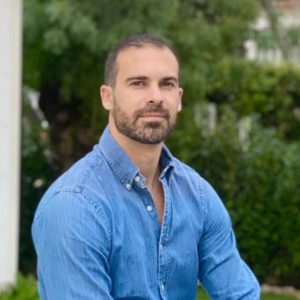
Patrick Martins, founder and managing partner of Green Swallow
In the instructional decision, delivered more than 20 months after the seizure, Judge Carlos Alexandre cited European legislation and the limit of 0,2% THC allowed in industrial hemp, but in the document he would end up referring to “2% THC”, which it may have been the scribe's lapse.
“The defendants here set out to market products of the type that were seized on the basis of the application in Portugal of community legislation that allows such activity for products or articles that do not have more than 2% THC (sic).”
Furthermore, the Judge stressed that “they acted convinced that they were acting in a way tolerated by Portuguese criminal law and socially accepted. The interrogations of the defendants were consistent with this rationale. There is, therefore, not all the evidence, factual elements that substantiate the objective elements of the type of drug trafficking. And, of course, what is not here in the specific case sub judice, considering the elements seized and the testimonies collected, is the subjective element in any of the forms of fraud. The defendants always acted convinced that they were embracing a business opportunity, which they saw practiced in countries of the community, an activity that even respected the ordinances to which Law 15/93, of 22 January is anchored.”
De in accordance with the provisions of art. 286 ° /1 do CPP - Code of Criminal Procedure, a instruction visa judicial evidence of the decision to prosecute or to close the investigation, in order to submit the case or not to trial. That is, the instruction is intended to verify whether there is sufficient evidence of the practice, by the defendants, of the facts and crimes of which they were accused, also serving to verify that all the procedural presuppositions on which the accusation depends are present. Carlos Alexandre considered not.
“Contrary to what was advocated by the Public Prosecutor's Office or adduced by the applicants for opening an investigationdog, the case files contain and they were scrutinized, evidence that is considered strong in order not to submit the defendants to trial for the crimes imputed to them in the accuserdog, thus referring to the fundamentaldog about the defendants.
 Consequently, being convinced that these facts are subject to “what the heck” the Judgment is stronger the probability of exoneratesdog of responsibility, I decide not to pronounce the defendants of the illicit that the Public Prosecutor's Office imputes to them. The expert reports and the final report of the Judiciary Police weighed in the light of the rules of common experience and the normality of the event that the defendants here were always convinced of the legality of their actions.dog.
Consequently, being convinced that these facts are subject to “what the heck” the Judgment is stronger the probability of exoneratesdog of responsibility, I decide not to pronounce the defendants of the illicit that the Public Prosecutor's Office imputes to them. The expert reports and the final report of the Judiciary Police weighed in the light of the rules of common experience and the normality of the event that the defendants here were always convinced of the legality of their actions.dog.
without intending to take a positiondog apodictic about goodness and legality, in the current state of the legislationdog Portuguese and the one received by way of regulationdog anchored by the European Union, although we cannot fail to say that we consider the considerations brought by the defendants to be reproduced, which we believe to regulatedog community exit and in force after Law 15/93, of 22/01 and Ordinance 94/96, of 26/03, has already been accepted in Portugal as learnedly explained by the defenders of the defendants.
Consequently, I do not consider that, with these elements, the probability of conviction is stronger than that of exclusion from liability, so it is imperative not to pronounce the defendants here, which is decided, determining the timely filing of the case. In due course, file it.”, he determined.
The case of João Costa: 0,2% THC purity is “a value lower than one dose”
On 23 February, the case of António João Costa, vice-president of Cannacasa – Associação do Cânhamo Industrial – was also shelved, “under the terms of Article 277 of the Criminal Procedure Code”. João had been made a defendant for the “crime of drug trafficking” on December 21, 2020, despite having explained to agents that what he had at home was industrial hemp, and his arrest was released to the press. He was present in court and he, too, was granted the coercive measure of term of identity and residence. In the notification he received from the Public Prosecutor's Office, it is read that the investigation was opened noting that João Costa “cultivates cannabis plants at his residence in (…)”.
“The denounced fact is likely to integrate the practice of a crime of drug trafficking, p. and p. By article 21, nº 1 of DL nº 15/93, of 22 January.
During the house searches of João Costa's residence, on 21/12/2020, the following were seized:
1363.600 grams of cannabis seeds;
24.100 grams of cannabis leaves;
467.900 grams of cannabis leaves (sic)
Interrogated as a defendant, João Costa said that he was an “industrial hemp producer” and that he had documentation that confirms his statements, in addition to having contacted the responsible authorities such as the Ministry of Agriculture, the GNR and the Judiciary Police, giving knowledge that the activity was being carried out”.
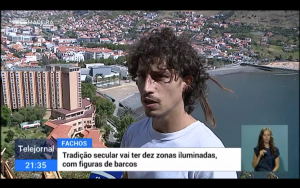
João Costa was arrested in Machico, Madeira, where he resides and is also president of the Cultural and Recreation Association of Facho da Ladeira.
João Costa’s notification goes on to say that “after the expert examination of the material seized, it turns out that, in fact, it is cannabis (missing leaves) but with a purity degree of only 0,2%, which gives, in total, a value lower than one dose, according to Ordinance 94/96. Seeds intended for sowing hemp for the production of hemp for industrial purposes must have a THC content that cannot exceed 0,2, which is the case in the present case”. The notification also states: “it appears from the documentation sent by the defendant that he requested authorization for the cultivation of hemp here in the Autonomous Region of Madeira, despite not having documented proof that he already had the respective authorization”.
“Now, in view of all the evidence produced in these documents, it is understood that, in fact, the defendant cultivated hemp for industrial purposes and that, as a result, he initiated a process with a view to being able to start the respective cultivation in compliance with all the rules and regulations. enforceable legal requirements. Thus, it is understood that there were not sufficient evidence of the practice by the defendant of the crime of drug trafficking, given that if the defendant owned hemp and started growing it without legal licenses/authorizations, he may incur administrative offences.”
In view of the above, and without further consideration, I decide to close the investigation, under the terms of article 277, no. 2, of the Criminal Procedure Code”.
Signs the Attorney of the Republic Carla Pinto.
The case of António, owner of a hemp shop in Lisbon
In exactly the same terms, the case of António (fictitious name, as he prefers not to be identified), managing partner of a cannabis store in the Greater Lisbon area, was also filed. In the filing process, to which Cannareporter had access, it can be read that “in this investigation, facts related to the sale of potential narcotic products in two commercial establishments were investigated (...) of THC less than 0,2%. The facts in question are likely to include, in the abstract, the practice of a less serious crime of trafficking in narcotics, p. and p. By arts. 21st, nº1 and 25th, al. A) of the Penal Code.

A T-Shirt in one of the more than 30 hemp-derived products stores that exist in Lisbon
In this case, the expert reports carried out on the products seized in one of the stores (only leaves and tops) revealed that some of them, namely sachets with cannabis leaves or tops, had degrees of purity between 0,3 and 0,5% THC, which exceeds the legal limit (0,2%) in Portugal, corresponding to one x daily doses. In the remaining cases, which met the limit of 0,2, the daily doses were not calculated, referring to a “purity degree of <0,2%, not corresponding to the daily dose”.
In this case, “a security specialist from the company TNT/Fedex was heard as a witness, who said that he was contacted by the Spanish security services of that company, telling him that, through canids, an order had been detected that indicated that he had a product of narcotic substances, but that the Spanish authorities had no legal basis to withhold such a postal package, as the documentation for the same indicated a THC content of less than 0,2% and, in Spain, the legal limit corresponds to 0,6%”.
Products seized with 0,3 and 0,5% THC contents are illegal in Portugal, but António assured Cannareporter that all the products he sold in the store had a certificate of analysis attesting to a value of less than 0,2% THC. . He also said that neither the police nor the court revealed to him which products had higher values, so he was not sure which supplier had lied in the certificate of analysis. In António’s filing process, it is also mentioned that he was “convinced that his activity is within the legal rules in force and that he always collaborated with the authorities, namely by authorizing searches of his establishments and voluntarily opening orders, in order to show to OPCs that the goods in question were not outside the law. And that is enough, as we believe, for us to consider that the defendant's conduct, taking into account the recent legal framework (in conjunction with the practical date of the facts), is not malicious (...) order to close the investigation, as sufficient evidence has not been collected that the defendant, with his conduct, fulfilled the subjective element of the crime in question”.

Most stores in Portugal sell hemp oils and flowers like the ones in this example photo
And, once again, it was decided that “in light of the foregoing, as sufficient evidence has not been collected regarding the completion of the subjective element of the type of crime under consideration in these records, I decide to close the investigation, under the terms of article 277, nº 2, of the Criminal Procedure Code. (…) I further promote the destruction of the seized narcotic product and eventual safe samples, in accordance with the provisions of Art.
António lamented to Cannareporter the loss of thousands of euros in products, not only those that were outside the THC limits, which were the minority, but also all others that met the limits, which were not returned to him. The same happened with all the other defendants, to whom the seized goods were never returned.
In addition to Patrick, João and António, at least one other owner of a similar store in Alentejo and another hemp farmer had their cases recently closed due to lack of evidence of a crime. These cases can therefore foresee a tendency of non-conviction of those who dedicate themselves to the production and trade of products derived from hemp in Portugal.
Police forces are not articulated with each other
The seizures were made by the PSP or the GNR and, in the case of some farmers, denounced by the DGAV, but the analyzes of the seized products are carried out by the Scientific Police Laboratory of the Judiciary Police (PJ).
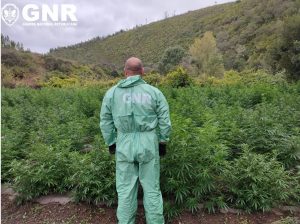
The GNR during the seizure of the hemp plantation of Pawel Szopa, near Sertã
Order No. 10953/2020, which defined the powers in terms of controlling the cultivation of hemp for industrial purposes, established, in point 7, that “The DGAV, the IFAP, the PJ, the GNR and the PSP must, in the maximum period of 30 days after the publication of this order, sign a protocol indicating the focal points of each entity and, in detail, the means of articulation between them”.
The truth is that, almost a year after this maximum period of 30 days, Cannareporter questioned the DGAV, the GNR and the PJ on the aforementioned protocol and it had not yet seen the light of day and, to date, it has not been made public. Analyzes by the Scientific Police Laboratory of the seized products took, on average, about 18 months, during which the defendants were forced to take coercive measures such as the identity and residence term, with mandatory periodic presentations to the police, normally twice a week, and the impossibility of leaving the country. In addition to these inconveniences in their personal lives, everyone completely lost the time and money invested in their productions or stock seized, in addition to the large sums they had to spend on their defence, with lawyers and legal and administrative costs.
GNR and PSP and PJ publicly accuse hemp producers of trafficking narcotics
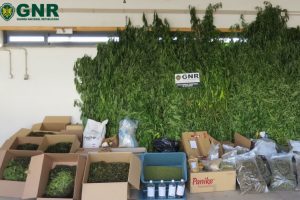
Barry McCullough's hemp seizure by the GNR took place in July 2021
Patrick Martins, João Costa and António were not, in fact, the only ones to be accused of the “crime of drug trafficking” in recent years in Portugal. Like him, several cannabis shop traders and industrial hemp producers were arrested, charged, made defendants and subject to identity and residency terms, in addition to being portrayed in the media as “traffickers”. In several cases, such as Barry McCullough, Hugo Monteiro ou Pawel Szopa, for example, the GNR – Guarda Nacional Republicana – sent press releases on the day of the seizure, saying that it was cannabis, before certifying that, in fact, it was industrial hemp. The GNR admitted to Cannareporter who couldn't tell hemp from cannabis. With Antonio João Costa the same happened, with the PSP sending a press release without first certifying what it had really seized.
Cannareporter also learned that the Judiciary Police visited a hemp producer months after he was arrested to ask him for samples of what he grew, but the farmer, who lives near Sertã, said he could not provide them with anything as the GNR had already taken everything. The PJ confided to the farmer that “that was not the procedure” and that the GNR would not have the competence to seize the plants in question. Here the story thickens. Cannareporter contacted the Judiciary Police to clarify the situation, but never received a response to the questions sent, in November 2021, despite insistence, both by email and by phone.
____________________________________________________________________________________________________
[Disclaimer: Please note that this text was originally written in Portuguese and is translated into English and other languages using an automatic translator. Some words may differ from the original and typos or errors may occur in other languages.]____________________________________________________________________________________________________

What do you do with €3 a month? Become one of our Patrons! If you believe that independent cannabis journalism is necessary, subscribe to one of the levels of our Patreon account and you will have access to unique gifts and exclusive content. If there are many of us, we can make a difference with little!
-
Laura Ramoshttps://cannareporter.eu/author/partner/
-
Laura Ramoshttps://cannareporter.eu/author/partner/
-
Laura Ramoshttps://cannareporter.eu/author/partner/
-
Laura Ramoshttps://cannareporter.eu/author/partner/
Related News
-
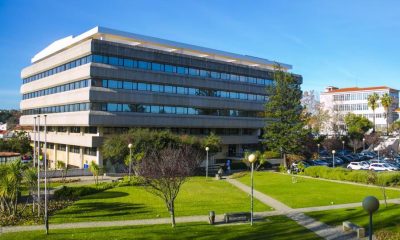

Catholic University debates the future of cannabis regulation
-
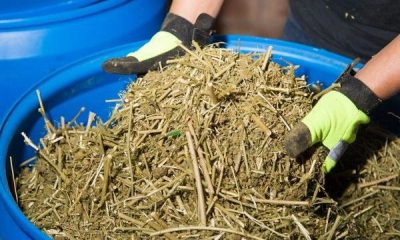

Infarmed and APA publish new rules for the management of medical cannabis waste
-
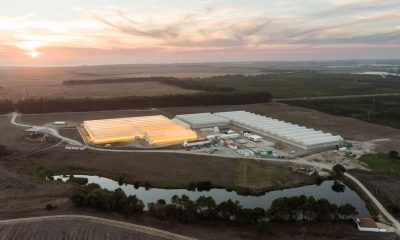

Clever Leaves receives approval from Infarmed to double cultivation area
-
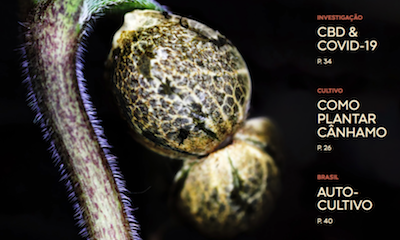

New paper cannabis magazine hits newsstands this week
-
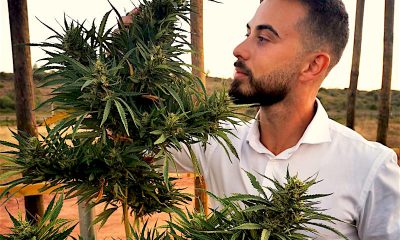

CannPrisma opens medical cannabis facilities in Castro Marim
-
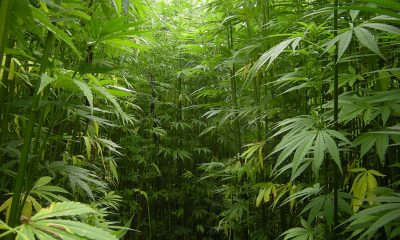

Cannacasa promotes online event related to hemp cultivation

Mais recentes


Álvaro Covões, who acquired land from Clever Leaves, says he has “no interest in growing cannabis”
At the beginning of April, we reported that Álvaro Covões, founder and CEO of 'Everything is New', had purchased the land where he was located...


Portugal's regulatory advantage in the cannabis industry
In the dynamic landscape of European cannabis cultivation, Portugal has emerged as an interim leader. Although it shares many natural advantages with...


ICBC Berlin shines again. It's the beginning of a new era for the cannabis industry in Germany
ICBC Berlin was the first major international cannabis conference to take place after the legalization of adult use in...


USA: Mike Tyson products recalled for mold contamination
California authorities have issued a mandatory recall notice for two products from Mike Tyson's cannabis brand,...


4:20 is coming and there are celebrations in Porto and Lisbon
The date for celebrating cannabis culture is approaching! This Saturday, April 20th, is the day when...


Paul Bergholts, alleged leader of Juicy Fields, detained in the Dominican Republic
Paul Bergholts, the alleged leader of the Juicy Fields pyramid scheme, has been detained in the Dominican Republic and will be subjected to...


Cannabinoids reveal promising results in the treatment of Borderline Personality Disorder
An investigation carried out by Khiron LifeSciences and coordinated by Guillermo Moreno Sanz suggests that medicines based on...


Juicy Fields case: 9 detained by Europol and Eurojustice. Scam exceeds 645 million euros
A joint investigation conducted by several European authorities, supported by Europol and Eurojust, culminated in the arrest of nine suspects...


Regular cannabis users may require more anesthesia during medical procedures
Regular cannabis users may require more anesthesia during medical procedures to remain sedated compared to...


The future of CBD in Japan: How legal reforms will shape the market
Late last year, Japan took a big step towards cannabis reform after approving...







